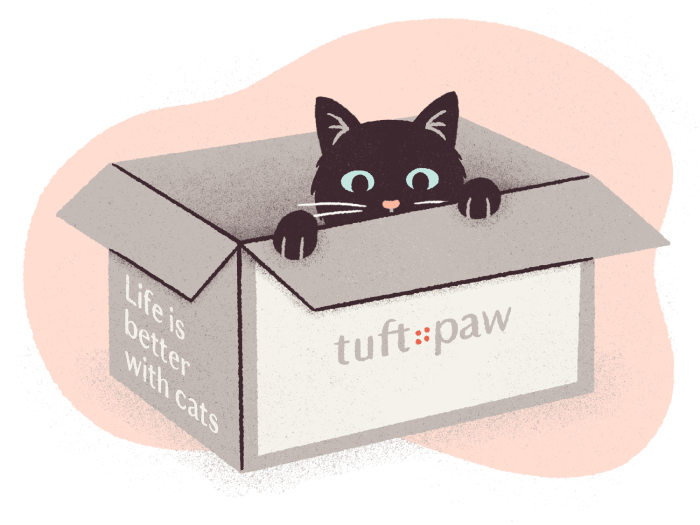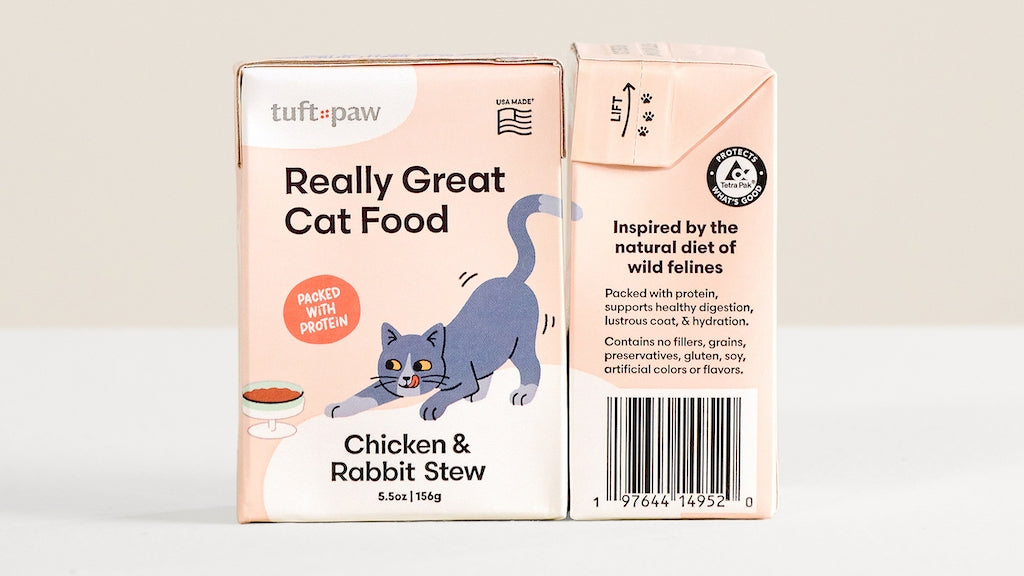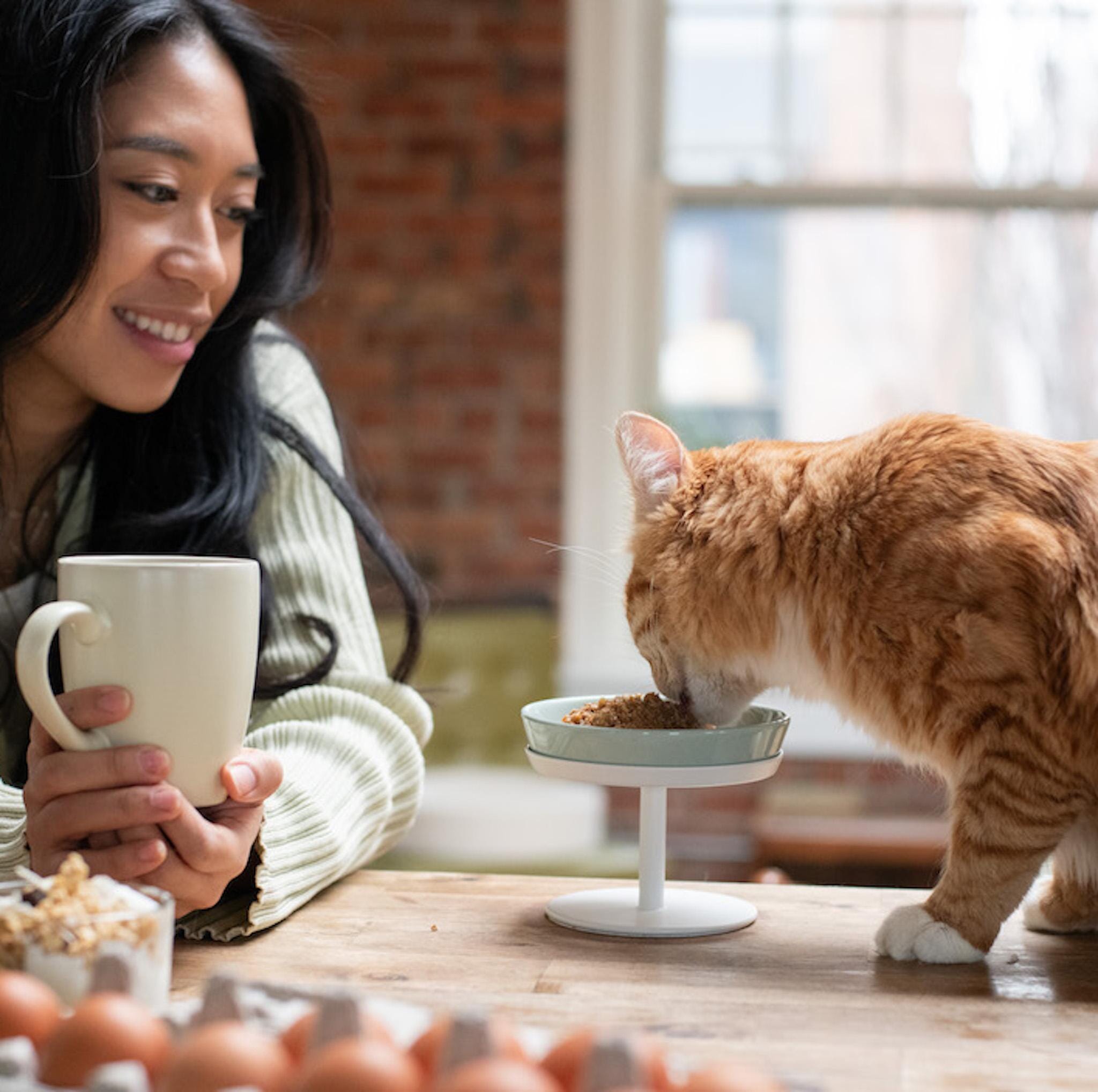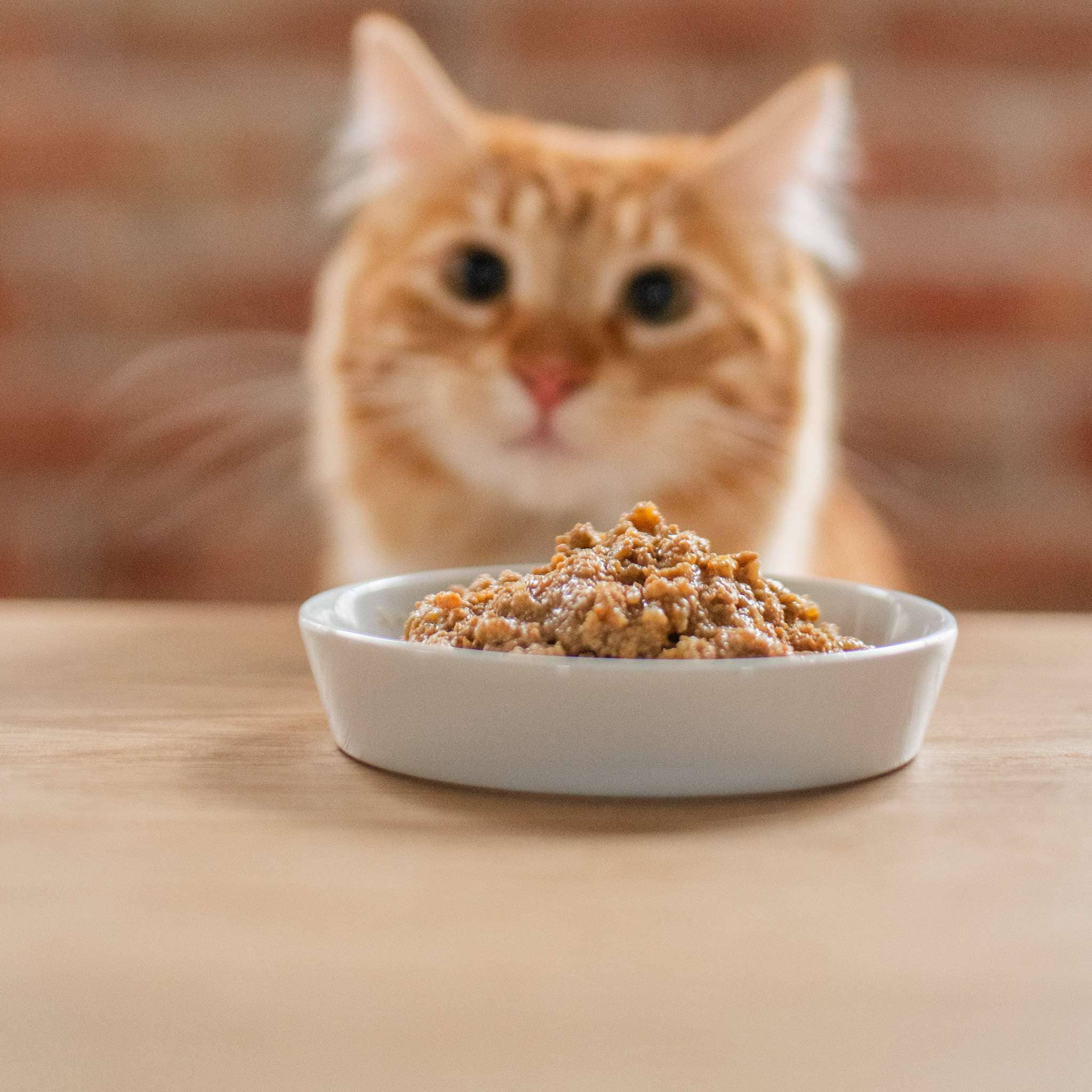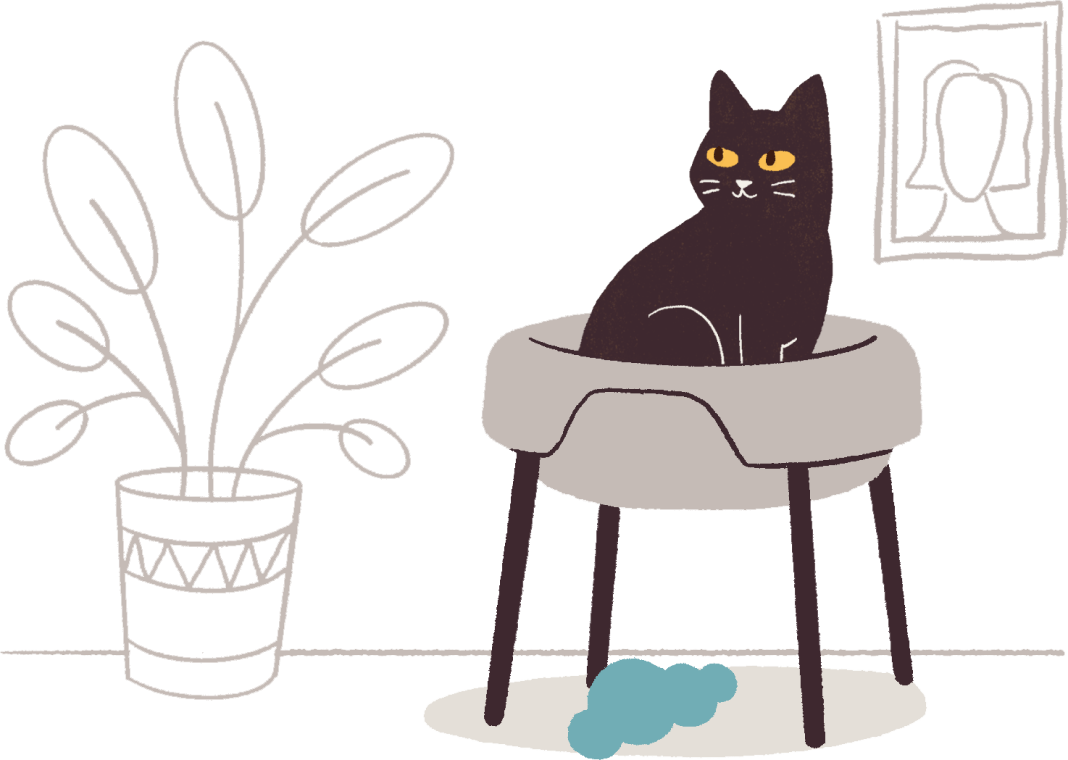It’s sad to think about, but some cats suffer from food allergies or sensitivities that can lead to uncomfortable symptoms like itching and digestive issues. Thankfully, food allergies can be easily treated once identified by feeding your cat a hypoallergenic cat food. In this article, we'll explain what to look for when choosing a hypoallergenic food and give you our picks for the best hypoallergenic cat foods on the market today.
Here at tuft + paw, we are cat experts. We're intimately familiar with the cat food features that are most important to cats and cat parents alike. This list is based on consultation with a feline nutritionist, veterinarian, hundreds of online reviews, and our own experience as cat parents.
Tip: If your cat lives indoors, it’s also worth checking out the best indoor cat foods.
Cheat Sheet: The Best Hypoallergenic Cat Foods
1) Koha Limited Ingredient Diet Rabbit Au Jus for Cats
| Pros | high quality animal protein, 96% rabbit (exclusive of water), novel protein for cats with food allergies, low carbohydrates, no fillers, very high moisture content, green mussel for omega-3s |
| Cons | pricey, unsuitable for kittens |
| Calories | 139 cal/5.5 oz = 25 cal/oz |
| Price | $96.76 for 24 x 5.5-oz cans = $0.73/oz |
2) RAWZ 96% Duck & Duck Liver Paté
| Pros | high quality animal protein, first 3 ingredients are duck-based, novel protein, low carbs, good moisture content, dietary fiber to aid digestion, salmon oil for omega-3s |
| Cons | not widely available |
| Calories | $82.99 for 24 x 55-oz cans = $0.63/oz |
| Price | 181 cal/5.5 oz can = 33 cal/oz |
3) tuft + paw Really Great Cat Food
| Pros | high quality animal protein, first 2 ingredients are chicken-based, low carbohydrates, no fillers, dietary fiber to aid digestion, salmon oil for omega-3s, affordable price point, high moisture content, human-grade ingredients |
| Cons | not available in pet stores |
| Calories | 138 cal/5.5 oz box = 25 cal/oz |
| Price | $69 for 24 x 5.5 oz box = $0.52/oz |
4) Honest Kitchen Minced Salmon & Cod
| Pros | high quality animal protein, first 3 ingredients are fish-based, low carbs, high moisture content, dietary fiber to aid digestion, salmon for omega-3s |
| Cons | contains sunflower oil |
| Calories | 137 cal/5.5 oz box = 25 cal/oz |
| Price | $39.48 for 12 x 5.5 oz box = $0.60/oz |
5) Hill's Prescription Diet z/d Skin/Food Sensitivities Original Flavor Wet Cat Food
| Pros | hydrolyzed animal protein to minimize allergies, single protein source, good moisture content |
| Cons | expensive, high carb content, some cats don’t like it, recent poor reviews, contains soybean oil and corn starch |
| Calories | 173 cal/5.5-oz can = 31 cal/oz |
| Price | $91.99 for 24 x 5.5-oz cans = $0.70/oz |
What Is Hypoallergenic Cat Food?
Hypoallergenic cat food is specially formulated to reduce the likelihood of triggering allergic reactions in cats with sensitivities or allergies to certain ingredients. These formulas typically feature limited and carefully selected ingredients, with a focus on high-quality proteins and minimal additives that could potentially cause allergic reactions. The goal of hypoallergenic cat food is to provide a nutritious and balanced diet while minimizing the risk of adverse reactions.
Tip: Some cats may not have specific food allergies but still benefit from a cat food for sensitive stomachs.
 Really Great Cat Food & Dock Bowl by tuft + paw
Really Great Cat Food & Dock Bowl by tuft + paw
What Are the Most Common Cat Food Allergies?
While protein allergies in cats are relatively uncommon, it is still a concern for some cat owners. Below is the occurrence of different food allergies in cats. Beef and dairy are the most common.
|
Identifying the specific allergen affecting your cat will require a consultation with a veterinarian and likely a process of elimination in their diet. Once you've pinpointed the culprit, transitioning to a hypoallergenic cat food can help alleviate symptoms and improve your cat's overall well-being.
Note: If your cat suffers from allergies, don't rule out a non-food allergy as the culprit! Cats can be allergic to environmental allergens (pollen, dust, molds, grass), medications, or parasites like fleas.
What to Look for In a Hypoallergenic Cat Food
High Quality Animal Protein
Cats are obligate carnivores, meaning they rely on meat for their essential nutrients. Ensure that their cat food contains high quality animal-based protein sources as the first ingredients. Avoid foods that rely on animal byproducts, animal meals, or plant proteins for their protein content, as these are less digestible.
Tip: See our list of the best high protein cat foods.
Hydrolyzed or Novel Proteins
Foods with hydrolyzed proteins are less likely to trigger allergic reactions because the animal proteins are broken down into smaller molecules that the immune system doesn’t recognize as allergens. These foods are often fairly pricey and require a veterinarian to prescribe them.
Novel proteins are proteins that your cat hasn't been exposed to before, reducing the likelihood of triggering an allergic reaction. Consider hypoallergenic cat foods that incorporate novel protein sources like rabbit or duck.
Limited Ingredients
Choose hypoallergenic cat foods with limited ingredients to minimize the risk of exposure to potential allergens. These formulas typically contain one or two protein sources and fewer additives and fillers than most cat food, making them gentler on sensitive digestive systems.
 Really Great Cat Food & Dock Bowl by tuft + paw
Really Great Cat Food & Dock Bowl by tuft + paw
Healthy Animal Fats
Ensure that the hypoallergenic cat food contains healthy animal fats like chicken fat or salmon oil, which are essential for skin and coat health. Avoid formulas with low-quality fats or excessive plant-based oils, which may not provide adequate nutrition for your cat.
Of particular note are omega-3 fatty acids, which possess anti-inflammatory properties. Including these in your cat's diet can help reduce inflammation throughout their body, whether in the digestive tract or on their itchy skin. Look for an omega-3 supplement in cat food, such as salmon or any kind of fish oil (unless your cat is allergic to fish of course).
Tip: Omega-3 fatty acids should also be supplemented in the best kitten foods to aid with brain and eye development.
Low Carbohydrates
All cat foods should prioritize protein and fats over carbohydrates. Cats in the wild eat minimal carbs (i.e. just what’s in their prey’s stomach), and replicating this at home supports their nutritional needs. Cats’ digestive systems are far better adapted to digesting and absorbing nutrients from protein sources than carbs, which is why low carb cat foods are often recommended.
Tip: If your cat has a grain sensitivity, see our list of the best grain-free cat foods for product recommendations.
Sufficient Moisture Content
Adequate hydration is crucial for cats, especially those prone to urinary tract issues. Choose hypoallergenic cat foods with a high moisture content to ensure your cat stays properly hydrated. Cats with food allergies may experience more frequent vomiting or diarrhea, which removes water from the digestive system, so replenishing that lost moisture is essential.
Meets AAFCO Nutritional Standards & Life Stage Requirements
When selecting cat food, always check if it meets the nutritional standards set by the Association of American Feed Control Officials (AAFCO). This ensures that the food is formulated to provide a complete and balanced diet for your cat. AAFCO compliance is a crucial indicator of the food's quality and suitability for your cat's overall health.
Additionally, check the AAFCO statement on the label to ensure it’s appropriate for your cat's specific life stage. A cat’s different life stages have different nutritional requirements. For example, kittens need a higher calorie diet than adult cats to support their rapid growth, while senior cats benefit from diets that maintain muscle mass.
Here are the key AAFCO terms you’ll see on a label:
- Complete and Balanced – “Complete” means the product contains all the nutrients required. “Balanced” means the nutrients are present in the correct ratios.
- “Growth” life stage – Early life stage when kittens have greater nutritional needs to fuel their growth and development.
- “Maintenance” life stage – Adult cats who are no longer growing only require nutrition for maintenance of a healthy body weight.
- “Gestation/lactation” life stage – Pregnant/mother cats who need to feed their kittens have greater nutritional needs than non-pregnant, non-lactating adult cats.
- All life stages – This means the food is appropriate for both kittens and adult cats, though feeding directions will vary depending on your cat’s life stage.
Tip: Read about when to switch from kitten to cat food if you’re concerned about transitioning your young cat off of kitten food.
Our Criteria for Choosing the Best Hypoallergenic Cat Food
- Meets AAFCO Standards – All foods on this list are formulated to meet the AAFCO Cat Food Nutrient Profiles for either adult cats, growth and reproduction, or all life stages.
- High quality animal protein – All foods on this list prioritize easily digestible animal proteins as their first ingredients rather than animal byproducts.
- Healthy fats – Quality cat food should contain healthy fats from animal sources, such as meat or fish oil.
- Moisture content – High moisture content in food facilitates digestion and helps cats avoid the health problems associated with dehydration.
- Carbs & plant-based content – Cats are obligate carnivores who should be eating primarily animal protein, so we prefer foods with low carbohydrate content and low plant material content.
- Price
Deep Dive: The Best Hypoallergenic Cat Foods
1) Koha Limited Ingredient Diet Rabbit Au Jus for Cats

Price: $96.76 for 24 x 5.5-oz cans = $0.73/oz
Calories: 139 cal/5.5 oz = 25 cal/oz
Life Stage: adult maintenance
Our pick for the best hypoallergenic cat food is Koha’s Limited Ingredient Diet Rabbit Au Jus wet food. Rabbit is a novel protein for most cats, so it’s a great choice for cats with diagnosed or suspected protein allergies. It’s also a biologically appropriate protein source considering that small mammals are common prey for wild cats. Aside from allergies, this food is just overall high quality. It’s high in easily digestible animal protein (96% rabbit excluding water content), very low in carbs, and has a high moisture content to help with hydration. We also like the inclusion of green mussels for the extra dose of anti-inflammatory omega-3s.
The main drawback is that this food is somewhat expensive at $0.73 per ounce. It’s also designated for “adult maintenance”, so it would not meet the nutritional needs of growing kittens.
|
Ingredients: Rabbit, Water Sufficient For Processing, Ground Flaxseed, New Zealand Green Mussel, Agar Agar, Pumpkin, Potassium Chloride, Choline Chloride, Salt, Taurine, Dried Kale, Cranberries, Ginger, Turmeric, Iron Proteinate, Zinc Proteinate, Vitamin E Supplement, Thiamine Mononitrate, Copper Proteinate, Manganese Proteinate, Sodium Selenite, Niacin Supplement, D-Calcium Pantothenate, Pyridoxine Hydrochloride, Riboflavin Supplement, Vitamin A Supplement, Biotin, Potassium Iodide, Vitamin D3 Supplement, Vitamin B12 Supplement, Folic Acid. |
|
Guaranteed Analysis
|
Dry Matter Analysis
|
| Pros | Cons |
|
|
2) RAWZ 96% Duck & Duck Liver Paté
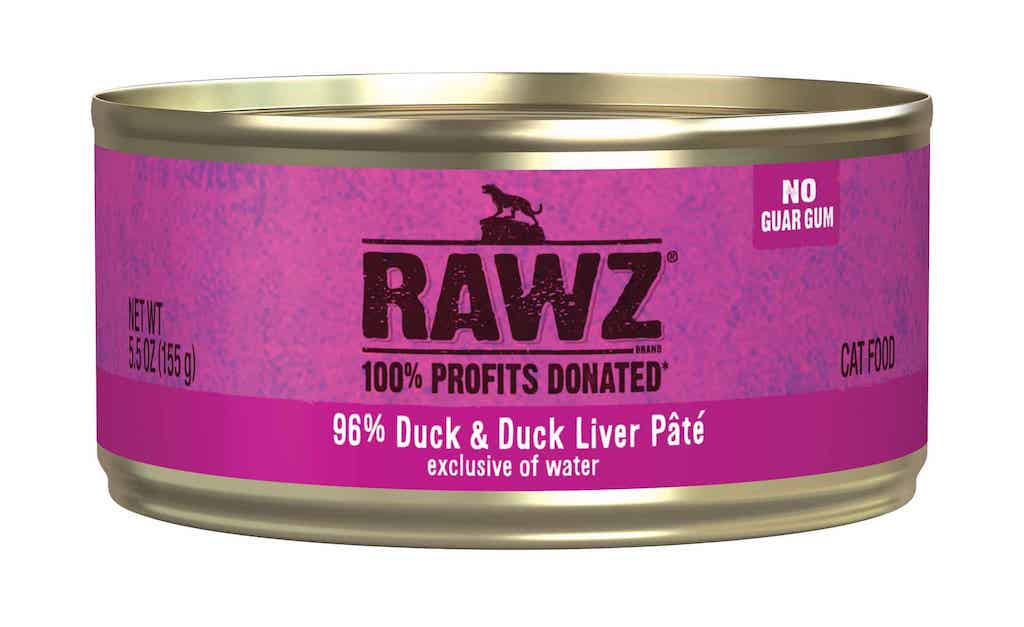
Price: $82.99 for 24 x 5.5 oz cans = $0.63/oz
Calories: 181 cal/5.5 oz can = 33 cal/oz
Life Stage: all life stages
Our runner-up for the best hypoallergenic cat food is RAWZ 96% Duck and Duck Liver Pate. As the name suggests, 96% of this recipe is duck (excluding the water content), a novel protein for most cats and one that is easily digestible. There are no filler carbs and all the plant ingredients serve nutritional purposes like adding dietary fiber or essential vitamins. At $0.63 per ounce, it’s not cheap but is fairly priced considering the quality of the ingredients. Unfortunately, RAWZ is not the easiest brand to find because they’re not at any big box stores or major online retailers. You’ll have to find them at a smaller pet store, whether in person or online.
|
Ingredients: Duck, Vegetable Broth, Duck Liver, Salmon Oil (preserved with mixed tocopherols), Fenugreek Seeds, Dandelion Greens, Taurine, Natural Flavor, Tricalcium Phosphate, Potassium Chloride, Choline Chloride, Zinc Proteinate, Iron Proteinate, Niacin Supplement, Vitamin E Supplement, Copper Proteinate, Magnesium Proteinate, Sodium Selenite, Calcium Iodate, Thiamine Mononitrate, Manganese Proteinate, Vitamin A Supplement, Calcium Pantothenate, Riboflavin Supplement, Pyridoxine Hydrochloride, Salt, Biotin, Vitamin D3 Supplement, Vitamin B12 Supplement, Folic Acid. |
|
Guaranteed Analysis
|
Dry Matter Analysis
|
| Pros | Cons |
|
|
3) tuft + paw Really Great Cat Food
Price: $69 for 24 x 5.5 oz box = $0.52/oz
Calories: 138 cal/5.5 oz box = 25 cal/oz
Life Stage: all life stages
Disclaimer: Yes, we included our own cat food here. This is because we truly think it performs excellently compared to other cat foods on the market. We subjected it to the same scrutiny as every other food on this list and asked for honest opinions from experts and cat parents.
For cats with non-chicken protein allergies, tuft + paw’s Really Great Cat Food is an excellent option. This recipe prioritizes easily digestible animal protein in the form of chicken and rabbit. Together these two meat sources provide essential amino acids and fatty acids, particularly taurine and arachidonic acid which are both especially vital to cats. Salmon oil provides a boost of omega-3s to aid immune function, reduce inflammation, and assist in brain and eye health. There are no filler carbs and each plant-based ingredient is there for specific nutritional reasons (e.g. pumpkin puree for dietary fiber to prevent hairballs, moisture, and vitamins A, C, and K). The high moisture content and lack of gums and grains facilitate digestion and keep things running smoothly in the digestive system. Cat parents will also like the convenient subscription service and reasonable price tag of $0.52/oz.
|
Ingredients: chicken, chicken broth, pumpkin puree, rabbit, carrots, ground golden flaxseed, natural flavor, tricalcium phosphate, agar-agar, salmon oil, dandelion greens, potassium chloride, vitamins (vitamin E supplement, vitamin A supplement, vitamin B3 (niacinamide), vitamin B5 (calcium pantothenate), vitamin B1 (thiamine mononitrate), vitamin B2 (riboflavin), vitamin B6 (pyridoxine hydrochloride) vitamin B9 (folic acid), vitamin B7 (biotin), vitamin B12 supplement, vitamin D3 supplement), magnesium amino acid chelate, choline chloride, taurine, minerals (copper amino acid chelate, iron amino acid chelate, manganese amino acid chelate, potassium iodide, zinc amino acid chelate, sodium selenite), sea salt. |
|
Guaranteed Analysis
|
Dry Matter Analysis
|
| Pros | Cons |
|
|
4) Honest Kitchen Minced Salmon & Cod
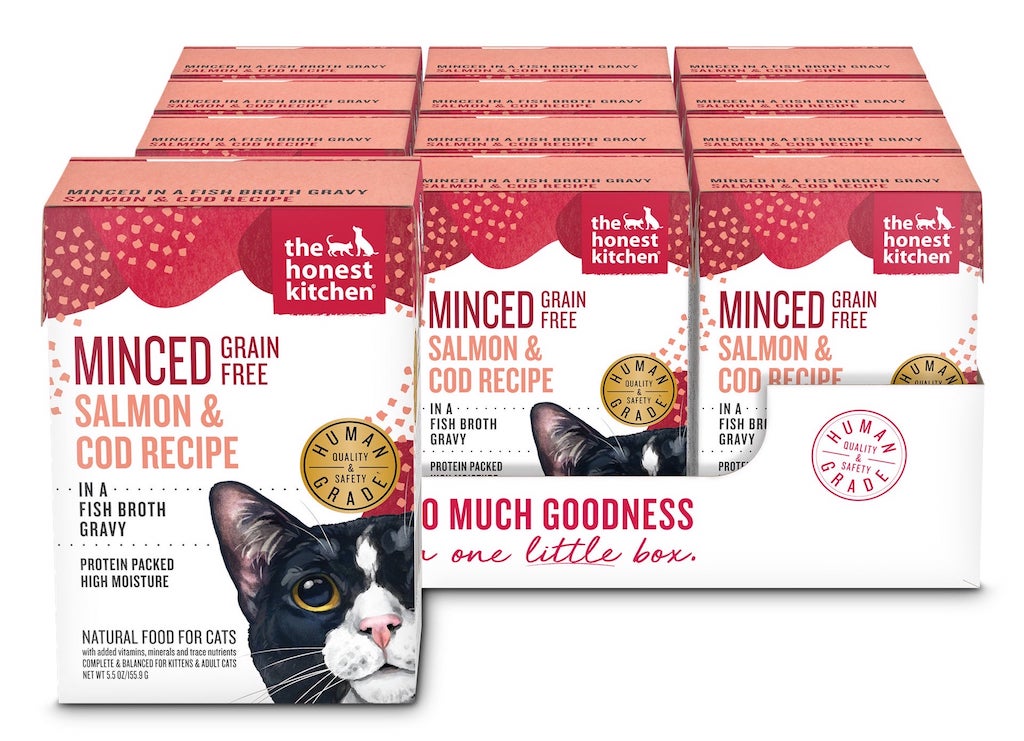
Price: $39.48 for 12 x 5.5 oz box = $0.60/oz
Calories: 137 cal/5.5 oz box = 25 cal/oz
Life Stage: all life stages
Honest Kitchen’s Minced Salmon & Cod is a high quality food for cats with non-fish food allergies. This food has high quality animal protein and is rich in anti-inflammatory omega-3 fatty acids (which is why it made our list of the best foods for senior cats). There are several carbohydrate sources, but all of them provide important nutrients and dietary fiber so we don’t consider any of them to be unnecessary. We also like the high moisture content which makes this food easy to process for sensitive digestive systems. It’s moderately priced at $0.60/oz too, so it won’t break the bank.
The only thing we don’t really like about this food is the inclusion of sunflower oil, which seems unnecessary considering the high animal fat content in salmon and cod.
|
Ingredients: Salmon, fish broth, cod, pumpkin, carrots, blueberries, cranberries, natural vegetable flavor, sunflower oil, agar-agar, dandelion greens, tricalcium phosphate, calcium carbonate, potassium chloride, choline chloride, salt, magnesium proteinate, vitamins (vitamin E supplement, vitamin A supplement, niacin supplement, calcium pantothenate (vitamin B5), thiamine mononitrate (vitamin B1), riboflavin (vitamin B2), pyridoxine hydrochloride (vitamin B6), folic acid, biotin (vitamin B7), vitamin B12 supplement, vitamin D3 supplement), minerals (copper proteinate, iron proteinate, manganese proteinate, potassium iodide, zinc proteinate, sodium selenite), taurine, yucca schidigera extract, turmeric. |
|
Guaranteed Analysis
|
Dry Matter Analysis
|
| Pros | Cons |
|
|
5) Hill's Prescription Diet z/d Skin/Food Sensitivities Original Flavor Wet Cat Food

Price: $91.99 for 24 x 5.5-oz cans = $0.70/oz
Calories: 173 cal/5.5-oz can = 31 cal/oz
Life Stage: adult maintenance
For cats with a diagnosed protein allergy, Hill’s Prescription Diet z/d Wet Cat Food may be just what the doctor ordered. It is a prescription food which needs to be purchased with the consultation of a vet. When cats develop protein allergies, their immune system reacts to recognizable features of the allergen protein. Hydrolyzed protein avoids this problem because it has been broken down into amino acids and tiny peptides which your cat’s immune system doesn’t recognize as an allergen. It flies under the immune system’s radar but still provides the necessary amino acids for survival. This food is made from hydrolyzed chicken liver as its single protein source. It also has a high moisture content to help with smooth digestion and hydration.
However, this food has a few noteworthy drawbacks. It’s fairly expensive at $0.70/oz. It also contains soybean oil and corn starch and has a high carbohydrate content. Recent reviews have mentioned a suspected formula change, with some cats refusing to eat it despite having eaten it in the past.
|
Ingredients: Hydrolyzed Chicken Liver, Water, Corn Starch, Powdered Cellulose, Soybean Oil, Calcium Carbonate, Potassium Chloride, DL-Methionine, Choline Chloride, Dicalcium Phosphate, vitamins (Vitamin E Supplement, Thiamine Mononitrate, L-Ascorbyl-2-Polyphosphate (source of Vitamin C), Niacin Supplement, Pyridoxine Hydrochloride, Calcium Pantothenate, Vitamin B12 Supplement, Riboflavin Supplement, Biotin, Vitamin D3 Supplement, Folic Acid), Iodized Salt, Calcium Sulfate, Cysteine, L-Lysine, Taurine, minerals (Zinc Oxide, Ferrous Sulfate, Manganese Sulfate, Copper Sulfate, Calcium Iodate), Potassium Citrate, Beta-Carotene. |
|
Guaranteed Analysis
|
Dry Matter Analysis
|
| Pros | Cons |
|
|
Hypoallergenic Cat Food FAQs
What are the most common food allergies in cats?
The most common food allergens for cats include beef, fish, and dairy. These ingredients can trigger allergic reactions, leading to symptoms like itching, digestive issues, or skin irritations.
How can I tell if my cat has a food allergy?
Symptoms of food allergies in cats may include itching, excessive grooming, hair loss, skin rashes, vomiting, or diarrhea. If you suspect your cat has a food allergy, consult with your veterinarian for proper diagnosis and management.
Can cats develop allergies to their food over time?
Yes, cats can develop allergies to their food over time, even if they've been eating the same diet for years without any issues. Sensitivities can develop due to prolonged exposure to certain ingredients or changes in the cat's immune system.
What should I do if I suspect my cat has a food allergy?
If you suspect your cat has a food allergy, it's essential to consult with your veterinarian for proper diagnosis and treatment. Your vet may recommend an elimination diet or allergy testing to identify the specific allergen affecting your cat.
Is hypoallergenic cat food the best option for cats with food allergies?
Hypoallergenic cat food can be an excellent option for cats with food allergies, as it typically features limited ingredients and novel protein sources to reduce the risk of allergic reactions. However, it's essential to consult with your vet to determine the best dietary approach for your cat's specific needs.
Is rotational feeding a good option for my cat?
Rotational feeding is starting to be recommended by some experts as a way to prevent your cat from developing protein allergies in the future. Especially if your cat is young, incorporating a rotating array of foods into their diet could set them up for digestive success down the road! Of course, it also makes meal time more interesting for our four-legged pals.
Conclusion
It can be really challenging when your cat has food allergies, but with the help of your vet and the right hypoallergenic cat food, your cat can live a happy and healthy life. Our favorite foods for cats with food allergies are Koha Pet’s Limited Ingredient Rabbit Au Jus and RAWZ 96% Duck & Duck Liver Paté, with their easily digestible novel proteins and high quality ingredients. Depending on your cat’s allergies, other good options could be tuft + paw’s Really Great Cat Food and The Honest Kitchen’s Minced Salmon & Cod. Each of these formulas prioritize easily digestible animal protein and have minimal additives. For cats with confirmed allergies to multiple proteins, you can ask your vet about Hill’s Prescription Diet z/d Food Sensitivities Wet Cat Food, which features hydrolyzed chicken liver to avoid allergic reactions. Remember to transition your cat to their new food slowly and exercise plenty of patience. Good luck!
